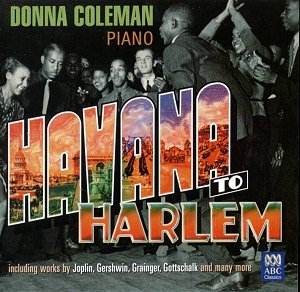 CD Reviews
CD Reviews MusicWeb
Webmaster: Len Mullenger
Len@musicweb.uk.net
[Jazz index][Purchase CDs][ Film MusicWeb][Classical MusicWeb][Gerard Hoffnung][MusicWeb Site Map]

Havana to Harlem
Louis Moreau GOTTSCHALK
(1829-1869)
O ma charmante, épargnez-moi! Caprice
Op.44 RO 182, (1861) [2.24]
Souvenir de Porto Rico (Marche des Gibaros)
Op.31 RO 250 (1857) [7.17]
Le Banjo – Grotesque Fantasie Op.15 RO 22 (c.1854-55)
[4.43]
Manuel Samell ROBREDO
(1817-1870)
Recuerdos de Gottschalk (c.1869) [2.04]
Ignacio CERVANTES
(1847-1905)
Danzas Cubanas (c.1890) [3.48]
Scott JOPLIN (1868-1917)
Solace – A Mexican Serenade (1909) [6.02]
The Entertainer (1902) [3.23]
Ferdinand Joseph Lamenthe
"Jelly Roll" MORTON (1885-1941)
Fingerbreaker – transcribed James Dapogny [3.23]
James P JOHNSON
(1891-1955)
Lonesome Reverie transcribed Riccardo Scivales
[3.17]
Carolina Shout (1914) [3.13]
George GERSHWIN
(1898-1937) – Walter DONALDSON
(1893-1947)
Rialto Ripples (Rag) (1917) [3.00]
George GERSHWIN
(1898-1937)
The Man I Love (1924) [4.15]
Love Walked In (1938) [4.46]
Percy GRAINGER
(1882-1961)
Lullaby from Tribute to Foster (1917) [7.12]
Donna Coleman (piano)
Recorded in the Eugene Goossens Hall, ABC, June
2000
![]() ABC CLASSICS 476 7743
[61.04]
ABC CLASSICS 476 7743
[61.04]
Anyone who programmes Jelly Roll Morton and James P Johnson alongside Joplin and Gottschalk has my vote on repertoire alone.
This is a disc that takes Ragtime forwards and back; Joplin, of course, but back to Robredo, born twelve years before Gottschalk, and whose Recuerdos de Gottschalk is so enjoyable a piece. And then forward to Gershwin whose Rialto Ripples, a rag, was written in the year of Joplin’s death. Morton often played rags – one of the most fascinating examples is on his 1938 Library of Congress discs – and elements of rag "survivals" can be found in a master of Harlem stride, James P Johnson, who was so influential on the next generation of pianists – Waller, Basie, Ellington among many (it would be good to have renewed hearing of Johnson’s big orchestral works such as the concerto.
The question as to how far the influence of Cuban music and rhythms infiltrated American popular music is a complex one – the cross currents that run through ragtime and country blues for instance, much less jazz, are book-length studies in themselves – but in its more modest way this disc poses interesting questions and provides clues as to habanera rhythms and specific technical matters that will certainly intrigue.
Gottschalk’s Souvenir de Porto Rico is a seven-minute patrol march, starting haltingly but opening up with grand excitement and seeming to presage that later popular song, so beloved of dance bands, The Clouds Will Soon Roll By. Ignacio Cervantes was younger than Gottschalk and his three tiny Danzas Cubanas were written around 1890. They’re still teeming with rhythmic élan – full, rich, and if too short for a recital certainly worth their place as an encore. Coleman balances Joplin – Solace, a beautiful song, subtitled Mexican Serenade, and once recorded with exquisite sensitivity by Soprano Summit - alongside the infinitely more popular The Entertainer. This is, as it should be, stately with good vertical chordal weight but also requisite lightness (but, my puritan soul asks quietly, why this when there’s bucket loads of Joplin from which to choose?)
Morton’s Fingerbreaker (also known as Finger Breaker or Fingerbuster – you get the point, it’s a toughie) is nicely done if without Jelly’s cocksure swagger and Johnson’s brace of compositions shows us the Joplin dilemma with one big hit, Carolina Shout, programmed next to the much less well known Lonesome Reverie. The latter rather shies away from Johnson’s own wit and constant rhythmic hi-jinx, tending to smooth out rhythms in concert-recital mode. The former has taken the 1944 disc Johnson made as a reference tool (both these pieces have been transcribed by Riccardo Scivales) though Johnson made a number of recordings of it (the first in 1921) and a piano roll in 1923. It’s the 1921 acoustic to which I listened; good though she is she can’t help sounding just a touch stiff and cautious after the composer himself.
Gershwin sees a wistful The Man I Love (contrast Jack Gibbons’ all-out 1920s style blitzkrieg of a performance) but she certainly brings out the exuberance of Grainger’s Foster tribute – in effect a Camptown Races paraphrase – with all its glittering right hand runs intact.
The recording is slightly boomy but it fails to dampen Coleman’s vigour. She writes extensive and intelligent notes, very much worth reading. I see this is volume 2; what about Joseph Lamb for a single composer disc along the way?
Jonathan Woolf